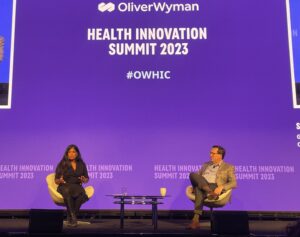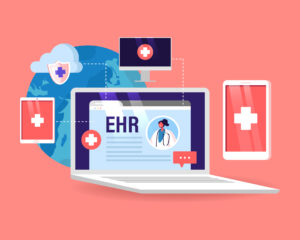
AI in healthcare
-
7 AI Pitfalls That Hospitals Should Avoid
As hospitals across the nation adopt more and more AI technology, there are some common hazards of which they should be wary. During a conference presentation on Tuesday, healthcare AI expert Suchi Saria laid out seven AI pitfalls hospitals should look out for — some of these include being duped by Big Tech companies’ marketing strategies and focusing too much on administrative use cases.
-
Babylon Health’s CEO ‘Should Spend Some Time With Elizabeth Holmes’
U.K. doctor David Watkins has been a public critic of Babylon Health and its AI technology for years, during which has received anonymous emails from Babylon employees who shared his concerns but feared to speak out publicly. After Babylon collapsed, a former employee publicly declared that the AI engine was indeed faulty. As a longtime skeptic of Babylon’s claims surrounding its technology, Watkins said that Ali Parsa, the company’s CEO, shouldn’t be treated any differently to Elizabeth Holmes.
-
Payer’s Place: Dawn Maroney
Dawn Maroney, President, Markets of Alignment Health and CEO of Alignment Health Plan, to discuss how they are using technology to provide better service and care to consumers.
-
How Meditech Plans to Integrate Google’s Generative AI Into Its EHR
Over the past year, Meditech has deepened its relationship with Google Cloud by exploring ways to embed Google’s generative AI into its EHR. Some of the use cases the EHR vendor is exploring include an enhanced search and summarization tool that would present clinicians with a longitudinal view of their patient and a tool that would auto-generate clinical documentation for the hospital course summary.
-
4 Steps Needed to Improve Patient Safety On a National Level, Per PCAST
The President’s Council of Advisors on Science and Technology (PCAST) issued a report that laid out four recommendations to improve patient safety across the nation. Some of these included creating federal leadership positions focused on advancing patient safety and hastening research on systems of safe care.
-
How Pitango VC Is Planning to Invest Its New $175M Health Tech Fund
Pitango Venture Capital, one of the largest venture capital firms in Israel, announced the first closing of a new $175 million healthcare technology fund. With the new fund, the firm plans to build a portfolio of approximately 15 new companies over a period of three to four years.
-
How Will Generative AI Change the Role of Clinicians In the Next 10 Years?
A new report predicted that generative AI tools will increasingly streamline many aspects of a clinician’s day in the next five to 10 years — and that this is particularly true for tools that can automate diagnoses and respond to patients’ questions.
-
Regard Teams Up With OpenAI to Develop Chatbot Functionality Built On GPT-4
Regard — a startup selling an AI co-pilot that helps clinicians diagnose medical conditions — announced a new partnership to add to its technology’s capabilities. The company is teaming up with OpenAI to release new chatbot functionalities built on OpenAI’s large language model GPT-4.
-
Innovaccer Unveils AI Suite With Automation Tools For Doctors, C-Suite Execs, Care Managers & More
Innovaccer announced a new suite of healthcare products. It comprises four different solutions — one for answering healthcare executives’ questions about their business metrics, one for automating care planning and documentation, one for generating clinical visit summaries, and one for streamlining workflows at contact centers.
-
Healthcare AI Trends to Watch: M&A Exits & Generative AI Use Cases
The healthcare AI space will be an exciting one to watch over the next couple years, as investment dollars flow to startups and providers launch more AI pilots. Two of the most interesting trends to watch will be the use cases that healthcare organizations prioritize when deploying generative AI models, as well as M&A activity within the healthcare AI field, a CB Insights analyst declared during a recent webinar.
-
Applying Remote Patient Monitoring to Surgery Prep and Recovery, Oncology and Women’s Health
Join us to learn about the latest trends in remote monitoring and how to extend its benefits beyond chronic conditions to more patients – all while using fewer staff resources.
-
How Geisinger, UNC Health Are Deploying Predictive Algorithms
Executives from Geisinger and UNC Health discussed the most impactful ways they have deployed predictive AI across their health systems during a recent virtual panel. At Geisinger, these predictive algorithms are reducing avoidable emergency department admissions, and at UNC, they are helping to identify sepsis before it becomes severe.
-
Advice Given by ChatGPT Vs. Human Providers Is Nearly Indistinguishable, NYU Study Says
NYU researchers conducted a study this year in which nearly 400 people were asked to identify whether responses to patient questions were produced by human providers or ChatGPT. Participants had a limited ability to tell the source of the responses apart, so the study authors concluded that the use of LLMs like ChatGPT could be an effective way to streamline healthcare providers’ communication with patients.
-
Devices & Diagnostics, Startups
French Startup Snags $14M for Prenatal Ultrasound AI Tool
Sonio recently gained $14 million in Series A funding. The Paris-based startup’s AI platform automates ultrasound reporting so that healthcare providers can conduct ultrasound exams with greater accuracy, speed and efficiency.
-
The 3 Hottest Areas for Healthcare Generative AI
There are three key areas of the healthcare sector where generative AI is booming the most — in terms of both venture capital funding and the development of innovative technology — according to Anjalika Komatireddy, an analyst at CB Insights. During a recent webinar, she discussed the generative AI activity occurring in these three areas: care delivery and navigation, digital therapeutics and drug discovery.
-
UPMC Algorithm Predicts Post-Surgical Complications Better Than the Industry Standard, Study Shows
Researchers at UPMC and the University of Pittsburgh created and deployed a machine learning algorithm that flags patients who are at high risk for postsurgical complications. The research team recently published research validating the tool in JAMA Network Open — the study found that the health system’s model outperforms the industry standard.
-
Butterfly Network Launches AI Tool for Point-Of-Care Lung Ultrasounds
Butterfly Network recently launched an AI tool that can provide medical practitioners with an accurate B-line count from just a six-second lung ultrasound clip. By automatically counting B-lines in a lung image, the tool helps doctors quickly identify and assess a patient’s lung issues at the point of care.
































